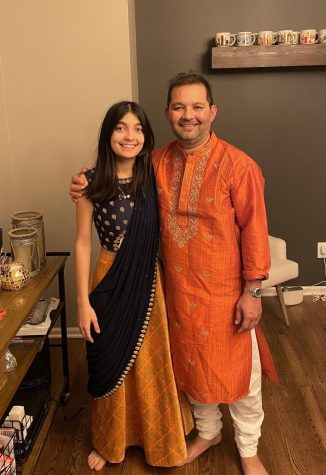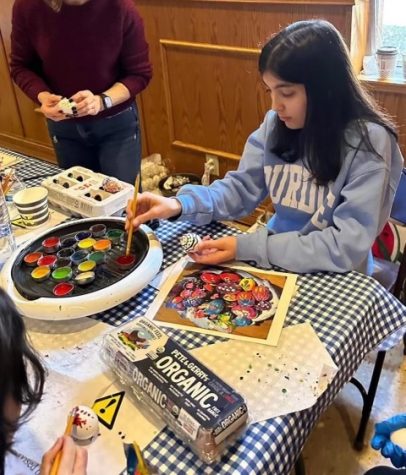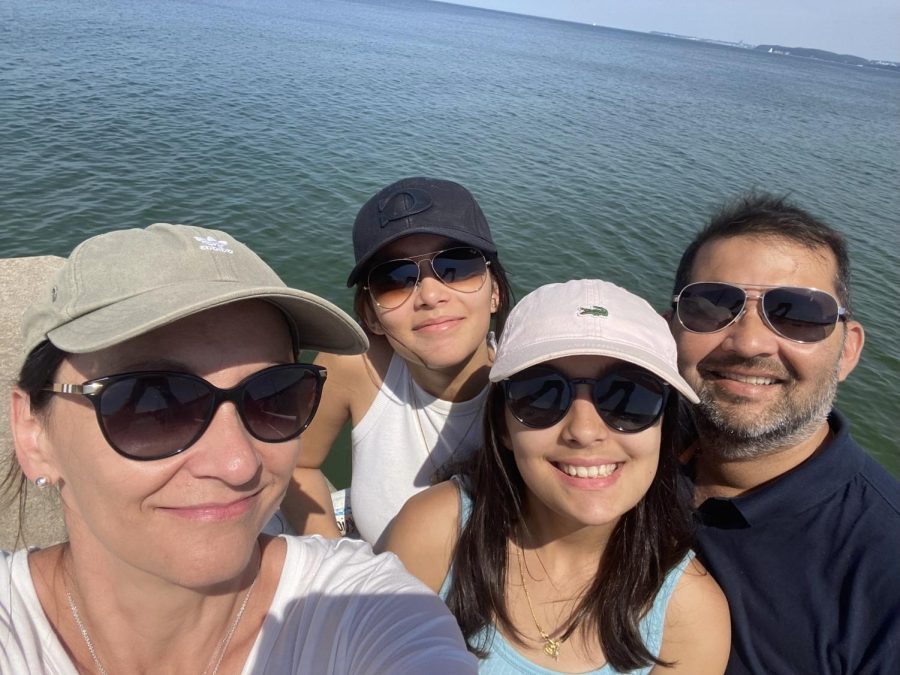“What are you?” This is a question familiar to multiracial individuals—people who may identify with more than one race or ethnicity—like senior Aiko Ileleji, who is half-Nigerian and half-Japanese.
“When (people) see me, I think most people can tell that I’m mixed but they wouldn’t know what I’m mixed with. I always ask, ‘What did you think I was?’ and it’d be totally off,” Aiko said. “It’s kind of funny. One person thought I was Black and white and I was like, ‘No, I do not have any white (in me)’ and another person thought I was Mexican.”
Like Aiko, sophomore Maxwell Gootee, who is half-Chinese and half-American, said the first question people ask is usually about his racial background.
“As soon as I meet someone, usually that’s the first question on their mind and it’s gotten to the point where so many people have asked it that I preemptively state what it is because if not, they’ll ask and it’s really awkward,” he said.
Aiko and Maxwell are part of the growing number of multiracial individuals since the United States legalized interracial marriage in 1967. According to the U.S. Census Bureau, there were 9 million multiracial individuals in 2010; that number grew to 33.8 million in 2020, marking a 276% increase.
In 2014, Project RACE, an organization advocating for multiracial individuals and their families, established Multiracial Heritage Week from June 7 to June 14. The organization created the week to not only celebrate multiracial individuals but to also address the challenges multiracial individuals face. For example, according to a Pew Research Center survey, 55% of multiracial adults surveyed had been subject to racist slurs or jokes.
Annabelle Atkin, assistant professor of human development and family studies at Purdue University, said these challenges are often overlooked.
Atkin said via email, “Multiracial teens might face discrimination in various forms, such as exclusion or rejection from monoracial ingroup members, stereotypes based on any of their group memberships, people—including their own family—denying their identity, or people making assumptions about their race.”
Freshman Nina Godbole, who is half-Polish and half-Indian, said although she has experienced insensitive remarks, she has not faced discrimination on a serious scale.
“People might make jokes here and there about how my skin’s tone is a little lighter. “They might say, ‘Oh, you’re not Indian,’ but I know they’re joking, (and) I guess it can annoy me sometimes but I don’t really let it get to me that much,” Nina said.
In fact, Nina’s father Vikram Godbole said he and Nina’s mother purposely chose the name “Nina” to avoid discrimination.

“Usually, people can’t tell (Nina’s ethnicity) because she is a mix between white and Asian and does not have a very traditional stereotypical name. We purposely did not name her with a traditional name with fear of racial bias and stereotype,” Mr. Godbole said via email. “Obviously, she does not look Caucasian, but, still, we have not witnessed any discrimination so far and are very thankful for that.”
But not all multiracial students have avoided discriminatory remarks. Aiko said she has experienced discrimination for being Black and for being Asian.
“My friends—before we were friends—they’d be like, ‘Have you eaten spiders before?’ and I’m like, ‘No, why would you think that?’ She probably thought that Asians ate (spiders),” she said. “Sometimes, it’s like discrimination because I’m Asian, and then sometimes it’s discrimination because I’m Black. So, that’s kind of like the balance (or) struggle (with being multiracial) because you’re like, ‘Why won’t I get accepted for both (sides of me)?’”
Aiko said the extent of discrimination she experiences depends on the people around her and the environment she is in.
“Here (in Carmel), I don’t think I feel (as much discrimination). I think it’s because there’s a lot more (diversity here),” Aiko said. “If I go to Japan, for instance, (people are) more like, ‘Oh, you’re not fully Japanese.’ Even though I have Japanese citizenship, they’re like, ‘Oh, you’re not Japanese because you’re half Black.’”
However, Maxwell said there is still discrimination and stereotyping here as well.
“A strong stereotype of mixed people is like a level of beauty (and) I know in school that circulates a lot,” he said. “There are a lot of beautiful mixed people but just in general, the stereotype of them being really beautiful can be harmful to other people. It sets expectations really high and when you don’t meet the same incredibly high expectations, it (just) feels bad.”
Moreover, Maxwell said his parents have also been subject to stereotypical perceptions.
“A lot of people view my dad as having a fetish for Asians, which is not the case, and that just hurts him a lot. Meanwhile, for my mom, they see her as using my dad for a green card which also isn’t the case and just because of that, there can be a lot of tension with us going out in public,” he said.

Maxwell’s mom, Ting Gootee, said these stereotypes present her with an opportunity to change people’s perceptions.
“(People think), ‘She (married her American husband) for the money or for the visa.’ And being an Asian woman in a professional and business environment, I am sure people make assumptions about who I am and what I am capable of or not capable of,” Mrs. Gootee said via email. “I take those (experiences) as opportunities and am motivated to make a different impression over time.”
Similar to Maxwell’s experience, Aiko said the fact that she has a lighter skin complexion than her Nigerian dad, Klein Ileleji, also led people to make assumptions about her family.
“There was one time when I was younger, I was fighting with my dad in the car and someone thought my dad was attacking me even though we were just having a conversation and I was just being a little kid,” Aiko said. “There were times when my dad and mom told me that some people thought that my dad was kidnapping me because I have lighter skin than him.”
Mr. Ileleji said he does not remember that experience.
“Probably (it) might have been an incident…(but) I don’t really recollect this,” Mr. Ileleji said via email. “Even though I’m Black in a society with so many social issues related to being Black, I was raised in Nigeria with very little understanding and personal experiences with discrimination based on the color of your skin. So, I’m not so guarded being black and might have sometimes not even seen discrimination when it was given to me.”
Ultimately, Atkin said families and schools need to foster an inclusive environment. Support from parents and teachers, she said, is important.
“Families need to prepare children for possible discrimination. A lot of support (comes) from parents creating a safe and open environment for (their child) and listening and validating their experiences, giving informed advice and taking action to advocate for their child,” she said. “Moreover, it is important for teachers to make all of their students aware and educated about multiracial experiences, while also teaching children how to be inclusive of their diverse peers.”
Mr. Godbole said he agreed with Atkin.
“(Our family talks) about why discrimination is wrong and how to deal with typical stereotypes and how to spot racial bias and how to stand up for yourself and others. There should be no space for discrimination anywhere in the world and we all have (the) responsibility to get rid of such mentality,” Mr. Godbole said.
Despite the challenges of being mixed race, Nina said she is proud of her racial background.
“There may have been times (when) I don’t feel like I completely fit in because I am different, but I like who I am and I like that I’m a little different because I think it makes me unique,” she said.
In honor of Multiracial Heritage Week, Atkin said she encourages all multiracial individuals to feel proud of who they are.
“I would like all multiracial teens to know that their uniqueness is beautiful and special and that they are not alone,” she said. “There will always be people in all of (your) communities who will embrace you and support you, so you should never shy away from joining a club or getting involved with any of your heritage groups. You belong.”































![What happened to theater etiquette? [opinion]](https://hilite.org/wp-content/uploads/2025/04/Entertainment-Perspective-Cover-1200x471.jpg)














































![Review: “The Immortal Soul Salvage Yard:” A criminally underrated poetry collection [MUSE]](https://hilite.org/wp-content/uploads/2025/03/71cju6TvqmL._AC_UF10001000_QL80_.jpg)
![Review: "Dog Man" is Unapologetically Chaotic [MUSE]](https://hilite.org/wp-content/uploads/2025/03/dogman-1200x700.jpg)
![Review: "Ne Zha 2": The WeChat family reunion I didn’t know I needed [MUSE]](https://hilite.org/wp-content/uploads/2025/03/unnamed-4.png)
![Review in Print: Maripaz Villar brings a delightfully unique style to the world of WEBTOON [MUSE]](https://hilite.org/wp-content/uploads/2023/12/maripazcover-1200x960.jpg)
![Review: “The Sword of Kaigen” is a masterpiece [MUSE]](https://hilite.org/wp-content/uploads/2023/11/Screenshot-2023-11-26-201051.png)
![Review: Gateron Oil Kings, great linear switches, okay price [MUSE]](https://hilite.org/wp-content/uploads/2023/11/Screenshot-2023-11-26-200553.png)
![Review: “A Haunting in Venice” is a significant improvement from other Agatha Christie adaptations [MUSE]](https://hilite.org/wp-content/uploads/2023/11/e7ee2938a6d422669771bce6d8088521.jpg)
![Review: A Thanksgiving story from elementary school, still just as interesting [MUSE]](https://hilite.org/wp-content/uploads/2023/11/Screenshot-2023-11-26-195514-987x1200.png)
![Review: "When I Fly Towards You", cute, uplifting youth drama [MUSE]](https://hilite.org/wp-content/uploads/2023/09/When-I-Fly-Towards-You-Chinese-drama.png)
![Postcards from Muse: Hawaii Travel Diary [MUSE]](https://hilite.org/wp-content/uploads/2023/09/My-project-1-1200x1200.jpg)
![Review: "Ladybug & Cat Noir: The Movie," departure from original show [MUSE]](https://hilite.org/wp-content/uploads/2023/09/Ladybug__Cat_Noir_-_The_Movie_poster.jpg)
![Review in Print: "Hidden Love" is the cute, uplifting drama everyone needs [MUSE]](https://hilite.org/wp-content/uploads/2023/09/hiddenlovecover-e1693597208225-1030x1200.png)
![Review in Print: "Heartstopper" is the heartwarming queer romance we all need [MUSE]](https://hilite.org/wp-content/uploads/2023/08/museheartstoppercover-1200x654.png)



